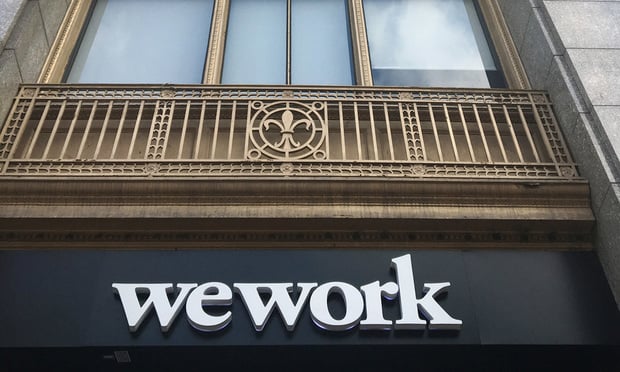As a Startup Hurtles Toward IPO, When Should Outside Counsel Say No?
What lessons can be learned from WeWork's IPO debacle?
October 21, 2019 at 05:00 AM
5 minute read
 The WeWork offices at 117 NE First Ave. in downtown Miami provide shared workspaces in part for technology startups as well as services for entrepreneurs. (Photo: Lidia Dinkova/ALM)
The WeWork offices at 117 NE First Ave. in downtown Miami provide shared workspaces in part for technology startups as well as services for entrepreneurs. (Photo: Lidia Dinkova/ALM)
Even under the supervision of an experienced in-house lawyer and a group of well-qualified outside counsel, a multibillion-dollar startup's plan to go public can still get derailed.
In one month, the co-working company WeWork went from getting ready for the public market to oustering its co-founder and chief executive Adam Neumann, and then indefinitely postponing its IPO.
WeWork's parent, The We Company, filed for the initial public offering Aug. 14. According to the company's S-1 filing with the Securities and Exchange Commission, New York firm Skadden, Arps, Slate, Meagher & Flom is handling the company's IPO work, while Simpson Thacher & Bartlett is representing its underwriters, led by Goldman Sachs and JPMorgan Chase.
After the filing, WeWork faced a series of roadblocks, including investors questioning the company's net worth and its corporate structure. The company ultimately asked its legal counsel to withdraw its IPO filings Sept. 30.
"It looks terrible for everybody, the lawyers, the bankers and WeWork," said Nori Gerardo Lietz, a senior lecturer at Harvard Business School who recently published an analysis of the office-rental company.
"At some point, the adult in the room has to stand up and say no," she added.
Skadden and Simpson Thacher both declined to comment on their representation of WeWork.
In her article, "Why WeWork Won't" Lietz pointed out the flaws in WeWork's financial statements and questioned its confusing corporate structure, concluding that the company would face serious business consequences if it failed to complete its IPO.
For example, Lietz noted, WeWork misstated the number and cost of the working desks it set up in the first half of the year. The prospectus filed in August said 273,000. Barely a month later, an amended filing said 106,000. The total gross cost is also different in the two fillings—in August, WeWork said it was $1.3 billion, but in September that was revised down to $800 million.
"They amended it twice, not once," Lietz said. "I don't know why the lawyers allowed them to submit the prospectus in the first instance, the way it was written."
The document also wasn't clear on some important governance issues, she said, including the fact that Neumann, still chief executive at the time, had been on the board's compensation committee, which means that he would have a say in his own compensation.
"If the CEO is given certain powers, those are the CEO's powers," said Dror Futter, a capital markets partner at Rimon P.C., who has been following the WeWork developments.
"The law gives corporate officers and directors significant discretion in running their company. As a result, even when there are no absolute prohibitions involved, you as an attorney may counsel the CEO that even though he or she has the power to do XYZ … you don't advise it," Futter said.
Outside counsel can be in a bind when dealing with a powerful founder because the lawyer has to balance the vision of the founders and the interests of the board, Futter said. Other Silicon Valley capital markets attorneys, who spoke with The Recorder but asked not to be named, agreed.
WeWork also has two chief legal officers, according to its S-1 filing. Jennifer Berrent, who joined the company five years ago from Wilmer Cutler Pickering Hale and Dorr, was promoted to co-president of the We Co. in April. While Jared DeMatteis, Berrent's colleague from Wilmer, also serves as WeWork's global general counsel.
The in-house lawyers, through a WeWork spokesperson, declined to comment.
"At the end of the day the attorney is not the client, and so outside of things that are just on their face illegal, lawyers are counselors, and they can advise the board, and the board can reject that advice," Futter said.
He added that if the attorney is very uncomfortable with the rejection, they can consider withdrawing from the representation although that is not common. He added, "there are limits to what the attorneys can do."
Neuman was forced to step down from his role as CEO on Sept. 24, and two WeWork executives, Artie Minson and Sebastian Gunningham, became co-CEOs of WeWork, taking the reins as the company attempts to navigate its future.
With the IPO shelved, WeWork's incomplete financial data makes it harder to assess the company's prospects as it tries to adapt to a future without the money expected from the IPO.
The company's biggest investor is Japanese bank SoftBank, which had invested $2 billion in WeWork at a valuation of $47 billion as of January. According to The Wall Street Journal, SoftBank has hired lawyers from Weil, Gotshal & Manges to help sort through WeWork's finances, as it seeks to gain further control of the company.
Several reports also revealed that WeWork could run out of cash by November. Its investors, including SoftBank and JPMorgan Chase, are working in an effort to save WeWork from going bankrupt.
"They don't have time, they have to raise a lot of money," Lietz stressed.
Read More
Skadden, Simpson Thacher Advise on Long-Awaited WeWork IPO
Chief Legal Officer of IPO-Bound WeWork Made Almost $900K Last Year
This content has been archived. It is available through our partners, LexisNexis® and Bloomberg Law.
To view this content, please continue to their sites.
Not a Lexis Subscriber?
Subscribe Now
Not a Bloomberg Law Subscriber?
Subscribe Now
NOT FOR REPRINT
© 2025 ALM Global, LLC, All Rights Reserved. Request academic re-use from www.copyright.com. All other uses, submit a request to [email protected]. For more information visit Asset & Logo Licensing.
You Might Like
View All
Law Firms Look to Gen Z for AI Skills, as 'Data Becomes the Oil of Legal'

Law Firms Expand Scope of Immigration Expertise Amid Blitz of Trump Orders
6 minute read
Pearl Cohen Enters San Francisco Market Via Combination With IP Boutique
Trending Stories
- 1Which Legal Tech Jobs Are on the Rise, and Which Aren't, with Jared Coseglia
- 2Absent Explicit Agreement, Court Rejects Unilateral Responsiveness Redaction of Text Messages
- 3SEC Whistleblower Program: What to Expect Under the Trump Administration
- 4Sidley Hires Paul Hastings Energy Finance Partner in Houston
- 5Potential Pitfalls in Arbitrating Religious Disputes
Who Got The Work
J. Brugh Lower of Gibbons has entered an appearance for industrial equipment supplier Devco Corporation in a pending trademark infringement lawsuit. The suit, accusing the defendant of selling knock-off Graco products, was filed Dec. 18 in New Jersey District Court by Rivkin Radler on behalf of Graco Inc. and Graco Minnesota. The case, assigned to U.S. District Judge Zahid N. Quraishi, is 3:24-cv-11294, Graco Inc. et al v. Devco Corporation.
Who Got The Work
Rebecca Maller-Stein and Kent A. Yalowitz of Arnold & Porter Kaye Scholer have entered their appearances for Hanaco Venture Capital and its executives, Lior Prosor and David Frankel, in a pending securities lawsuit. The action, filed on Dec. 24 in New York Southern District Court by Zell, Aron & Co. on behalf of Goldeneye Advisors, accuses the defendants of negligently and fraudulently managing the plaintiff's $1 million investment. The case, assigned to U.S. District Judge Vernon S. Broderick, is 1:24-cv-09918, Goldeneye Advisors, LLC v. Hanaco Venture Capital, Ltd. et al.
Who Got The Work
Attorneys from A&O Shearman has stepped in as defense counsel for Toronto-Dominion Bank and other defendants in a pending securities class action. The suit, filed Dec. 11 in New York Southern District Court by Bleichmar Fonti & Auld, accuses the defendants of concealing the bank's 'pervasive' deficiencies in regards to its compliance with the Bank Secrecy Act and the quality of its anti-money laundering controls. The case, assigned to U.S. District Judge Arun Subramanian, is 1:24-cv-09445, Gonzalez v. The Toronto-Dominion Bank et al.
Who Got The Work
Crown Castle International, a Pennsylvania company providing shared communications infrastructure, has turned to Luke D. Wolf of Gordon Rees Scully Mansukhani to fend off a pending breach-of-contract lawsuit. The court action, filed Nov. 25 in Michigan Eastern District Court by Hooper Hathaway PC on behalf of The Town Residences LLC, accuses Crown Castle of failing to transfer approximately $30,000 in utility payments from T-Mobile in breach of a roof-top lease and assignment agreement. The case, assigned to U.S. District Judge Susan K. Declercq, is 2:24-cv-13131, The Town Residences LLC v. T-Mobile US, Inc. et al.
Who Got The Work
Wilfred P. Coronato and Daniel M. Schwartz of McCarter & English have stepped in as defense counsel to Electrolux Home Products Inc. in a pending product liability lawsuit. The court action, filed Nov. 26 in New York Eastern District Court by Poulos Lopiccolo PC and Nagel Rice LLP on behalf of David Stern, alleges that the defendant's refrigerators’ drawers and shelving repeatedly break and fall apart within months after purchase. The case, assigned to U.S. District Judge Joan M. Azrack, is 2:24-cv-08204, Stern v. Electrolux Home Products, Inc.
Featured Firms
Law Offices of Gary Martin Hays & Associates, P.C.
(470) 294-1674
Law Offices of Mark E. Salomone
(857) 444-6468
Smith & Hassler
(713) 739-1250







